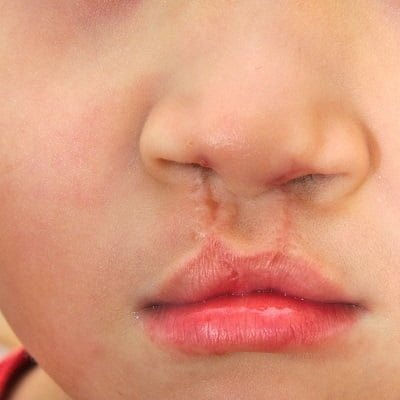Can My Baby Eat Normally Before the Surgery?
- aliza khan
- May 15, 2025
- 4 min read
Feeding a baby with a cleft palate can be a challenging concern for many parents. When preparing for the Best Palate Repair Surgery in Muscat, one of the most common questions is whether the baby can eat normally before the corrective procedure. Understanding the feeding process, challenges, and techniques before surgery is crucial for ensuring your infant receives proper nutrition and grows healthily.
This comprehensive article will address typical feeding issues, safe practices, and expert recommendations for babies with cleft palates awaiting surgery. Parents will gain clarity on how to manage feeding effectively and what support is available during this critical period.
Understanding Feeding Challenges with Cleft Palate:
What Is a Cleft Palate?
A cleft palate is an opening or split in the roof of the mouth that occurs when the tissues do not fuse properly during fetal development. This gap affects the baby’s ability to create suction, essential for normal breastfeeding or bottle feeding.
How Does Cleft Palate Affect Feeding?
The primary feeding challenge lies in the baby's difficulty in forming the vacuum necessary to draw milk. Food and liquid may also escape through the nose due to the communication between oral and nasal cavities.

Is Normal Feeding Possible Before Surgery?
Breastfeeding Challenges:
While some babies with cleft palates can breastfeed directly, many find it hard to latch properly. This can lead to inadequate milk intake and prolonged feeding times.
Bottle Feeding Options:
Special bottles and nipples designed for cleft palate infants help regulate milk flow and reduce air intake, making bottle feeding a viable alternative for many families.
Tube Feeding in Severe Cases:
In situations where oral feeding is insufficient or unsafe, supplemental feeding via nasogastric or gastrostomy tubes may be recommended to ensure adequate nutrition.
Safe Feeding Techniques Before Surgery:
Positioning for Feeding:
Keeping the baby in an upright position helps prevent milk from flowing into the nasal cavity and reduces the risk of choking or aspiration.
Using Specialized Feeding Equipment:
Devices such as squeezable bottles, one-way valves, and soft, wide nipples are engineered to accommodate feeding difficulties related to cleft palate.
Burping and Feeding Pace:
Frequent burping during feeding sessions and feeding slowly help minimize air intake and discomfort for the baby.
Nutrition and Growth Monitoring:
Importance of Adequate Nutrition:
Proper nutrition before surgery is essential for the baby’s growth and preparation for anesthesia and recovery.
Regular Weight Checks:
Healthcare providers closely monitor weight gain and overall health to ensure the baby is thriving despite feeding challenges.
Dietary Supplements if Needed:
In some cases, fortified breast milk or formula may be recommended to meet the baby’s caloric needs.
Role of Lactation Consultants and Feeding Specialists:
Professional Support for Parents:
Lactation consultants trained in cleft palate feeding provide personalized guidance to help parents navigate breastfeeding or bottle feeding challenges.
Customized Feeding Plans:
Specialists create individualized plans based on the baby’s specific cleft characteristics and feeding abilities.
Preparing for the Surgery: Feeding Considerations:
Adjusting Feeding Methods Closer to Surgery:
As the surgery date approaches, parents may need to adapt feeding techniques based on the baby’s progress and medical advice.
Managing Pre-Surgical Anxiety:
Clear communication and support help families feel confident in managing feeding and care before the operation.
Post-Surgery Feeding Expectations:
Temporary Feeding Adjustments:
After palate repair, babies often require modified feeding strategies during the healing process to protect the surgical site.
Gradual Return to Normal Feeding:
With proper care and monitoring, most infants resume normal feeding routines within weeks after surgery.
Common Concerns and Myths About Feeding Before Surgery:
Myth: Babies with Cleft Palate Cannot Breastfeed at All:
While challenging, some babies with cleft palate can breastfeed successfully with the right support.
Myth: Feeding Tubes Are Always Necessary:
Feeding tubes are reserved for cases where oral feeding is unsafe or insufficient, not as a standard practice.
Psychological Impact on Parents and Families:
Emotional Stress Related to Feeding Difficulties:
Feeding challenges can cause anxiety and frustration for parents, emphasizing the need for compassionate guidance.
Building Confidence Through Education:
Providing detailed information and support empowers parents to manage feeding effectively and prepare for surgery.

Innovations Improving Pre-Surgical Feeding:
Advances in Feeding Devices:
Continuous improvements in bottles and nipples make feeding easier and safer for cleft palate babies.
Telehealth and Remote Support:
Access to remote consultations with feeding specialists helps families regardless of location.
Importance of Multidisciplinary Care in Feeding Management:
Coordinated Efforts:
Successful feeding before surgery requires collaboration among surgeons, pediatricians, nutritionists, and speech therapists.
Holistic Approach:
Addressing feeding within the broader context of the baby’s health ensures optimal preparation for surgery.
Tips for Parents to Enhance Feeding Success Before Surgery:
Stay Calm and Patient:
Feeding can take longer and require more effort, but persistence is key.
Follow Professional Advice:
Adhering to recommendations on feeding methods and equipment improves outcomes.
Track Feeding Patterns:
Keeping a feeding log helps healthcare providers make informed adjustments.
Conclusion:
Feeding a baby before palate repair surgery can be challenging but is often manageable with the right knowledge and support. While babies with cleft palate may not feed normally in the traditional sense, many can achieve adequate nutrition through specialized techniques and tools. Parents planning for the best palate repair surgery in Muscat benefit greatly from multidisciplinary care that includes feeding guidance.



Comments